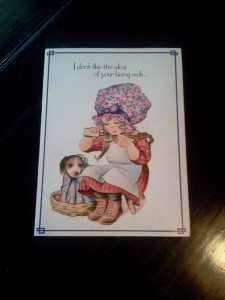A Forty-year Providence
 When I first saw it, it was all jumbled up with grocery ads and direct mail fliers that urged me to consider the metaphysical significance of my current gutter system. But this piece of mail, this greeting-sized envelope postmarked from Long Island, NY, was less noisy, unassuming somehow. I recognized the handwriting as belonging to my husband’s grandmother—a carefully-formed script that she’d learned through hours of instruction in elementary school, back before the ubiquitous keyboards and touch screens that now dominate our lives.
When I first saw it, it was all jumbled up with grocery ads and direct mail fliers that urged me to consider the metaphysical significance of my current gutter system. But this piece of mail, this greeting-sized envelope postmarked from Long Island, NY, was less noisy, unassuming somehow. I recognized the handwriting as belonging to my husband’s grandmother—a carefully-formed script that she’d learned through hours of instruction in elementary school, back before the ubiquitous keyboards and touch screens that now dominate our lives.
The card, I assumed, would be a late birthday card with the requisite birthday check. I’d heard from my mother-in-law how sorry her own mother was about the delay and how they had had so many things happening and to look for it soon. But when I opened it, it wasn’t what I expected. The envelope did include a check, but instead of a birthday card, it was a “Get Well Soon” card. Inside the same script had written:
Hope this card is inappropriate and that your recovery is complete!! Oh, and by the way—Happy Birthday!!
Still, it was fitting. I had been sick a couple weeks earlier and so perhaps a belated “Get Well Soon” was as relevant as a belated “Happy Birthday.”
But the greeting was the only thing that surprised me. The paper itself was thicker than normal; the picture on front was slightly faded; and the entire card seemed aged. Tiny brown spots dotted the edges and the once-white surface had turned a creamy off-white. Curious, I inspected the card more closely, and sure enough, it was stamped “MCMLXXV.”
1975.
Four years before I had even been born.
Immediately, my head started to spin. I was holding a greeting card that had existed longer than I had. And yet, my name was on it, the envelope was addressed to me, and the postscript clearly contemporary. The card I had just taken out of my mailbox had been posted only days earlier but had been waiting forty years to fulfill its purpose—it had been waiting forty years to extend belated birthday/get-well-soon greetings to me. And suddenly I felt very small. I didn’t feel special. I didn’t feel important. I felt humbled.
Precisely how I should feel after an encounter with Providence.
God’s providence can be described as that inexplicable combination of His love and power working out the details of our lives. It is what undergirds our belief that all things truly do work for together for good and that God knows the plans he has for us. Without it, we are simply the products of fate; or worse, victims of the consequences of our own choices and the choices of those around us. God's providence a wonderful, necessary doctrine that gives purpose and meaning to our days. It is also one that is easily misunderstood.
The most common way that Christians presume upon Providence is by assuming that we are the center of it. Sometimes we talk as if the whole world--the universe--has been orchestrated to provide this one moment in our lives.
When the manufacturer made this card, God had YOUR name stamped on it.
When the retailer sold this card to a customer, it was God’s way of getting it to YOU.
When this card sat in a drawer for forty years, it’s because God was waiting for YOU to need it on just this particular day.
As nice as these sentiments are, they feel a little too cliché for me. Almost contrived. The reality is that this card did not “have” to end up in my mailbox.
It could have been lost behind a desk. It could have been sent to another person. It could have been thrown away.
In forty years, any number of things could have happened to it, and if I don’t recognize this, then God’s providence will mean little. If I don’t recognize that it took a literal Act. Of. God. to direct that card to me, I won’t appreciate it when it happens. But, on the other hand, when I realize that the odds were stack against me, suddenly, I’m overwhelmed by the power of God when it shows up in my mailbox.
At the same time, if we don’t personalize the truth of God’s love, Providence becomes nothing more than a spiritual name for fate. A card ended up in my mailbox simply because God wanted it there and this fact has nothing to do with me. Unless of course, it does.
The beauty of Christianity is that it teaches us to embrace both the power of God and the love of God. The odds are indeed stacked against us; in the scope of time, we are small, insignificant beings. But even for our smallness, God loves us and does orchestrate events to care for us. Because if even a sparrow can’t fall without His notice, then a greeting card can’t find its way to my mailbox without it either.
In the end, we must embrace the paradox. We must embrace both His power (that card could have easily ended up somewhere else) and His love (that card ended up in my mailbox). And when we do—if providence has done her work—we’ll probably feel a bit like I did that afternoon when I found a 40-year-old greeting card sitting in my mailbox: Small and big at the same time.